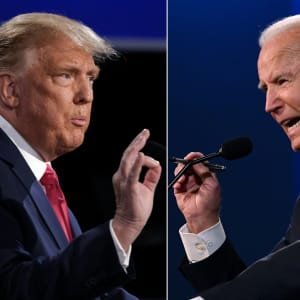On Presidential Primary Day, looking ahead to 2028 | Opinion
Leah Creiglow is a volunteer with Ocean State Ranked Choice Voting, a nonpartisan group advocatingfor voter choice and representation.
It’s all we’ve known for the past eight years. An era of American polarization seemingly never ending. Now, as this age of division enters its final stretch, with the presidential primary on April 2 and election on Nov. 5, it’s time to look beyond the dissension of the Trump-Biden legacy.
While the field for 2024 is all but set in stone, 2028 is shaping up to be a completely different story. With aging leaders facing impending term limits and waning patience, both parties are likely to have crowded tickets next time around. Generally, presidential primary elections tend to have a full slate of candidates. Just look at the 17 Republican contenders from 2016 and the 29 Democrats in 2020.
More: Want to make your vote count? Our RI voter's guide helps make your voice heard in Election 2024
With the bitter aftertaste of the 2020 election still lingering on our collective palates, we can anticipate another chaotic primary season in 2028 with fractured fields, mudslinging, and candidate withdrawals leading to “wasted votes” from early voters who already cast their ballots. In presidential primaries, where states finalize their ballots early, the candidate field changes frequently, and some states allow early or mail voting, this is a major problem.
In 2020, three million Democratic primary voters cast “wasted votes” and 700,000 Republicans did so in 2016. In January of this year, more than 5,500 New Hampshire Republicans cast a ballot for a candidate like Ron DeSantis or Chris Christie who’d recently dropped out. These names – and some of the other Republican contenders who’ve left the race – like Nikki Haley, will appear on R.I. ballots this primary day.
But there’s a way to make sure each and every vote counts. Ranked Choice Voting (or RCV) allows voters to rank multiple candidates in order of preference. Ballots that do not help voters’ top choices win count for their next choice. The candidate with more than 50% of first-choice votes wins outright. If no candidate gets a majority of first-choice votes, a new counting process begins. The candidate with the least amount of votes is eliminated, and that candidate’s voters’ ballots are redistributed to their second-choice pick. It works in all types of elections and generates better choices, better campaigns, and better representation.
In fact, RCV is the fastest-growing nonpartisan voting reform in the nation. According to a 2023 poll, 61% of American voters want to rank candidates in presidential primary elections.
Currently, RCV is used in 50 American jurisdictions that are home to over 13 million voters. That includes two states (Maine and Alaska), 3 counties, and 45 cities. Military and overseas voters cast RCV ballots in federal runoff elections in six states.
More: This commission agrees RI's voting system is not the best, but can't agree on what's better
Earlier this year, Rhode Island Sen. Val Lawson and Rep. Rebecca Kislak introduced RCV bills in the General Assembly. The proposals would institute RCV for presidential preference primaries, beginning with the 2028 Presidential Election. These bills have bipartisan support of more than 60 of the state’s top lawmakers and innovators and would pave the way for a new era.
It’s time we end the political polarization of this country and take an active role in cultivating and maintaining a representative government for the people, by the people.
With RCV, voters know that if their first choice doesn’t win, their vote automatically counts for their next choice instead. This frees them from worrying about how others will vote and which candidates are more or less likely to win. With the antiquated “choose-one” system currently in place here in Rhode Island, voters must become strategists at the ballot box, asking themselves how to maximize their vote. Should they vote for their honest favorite or vote for one of the frontrunners who has a chance to defeat their least favorite candidate?
This is not the formula for representative government.
This article originally appeared on The Providence Journal: Ranked choice voting is the fastest-growing nonpartisan voting reform in the nation.





